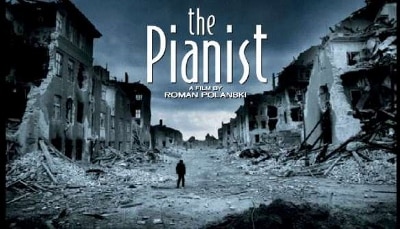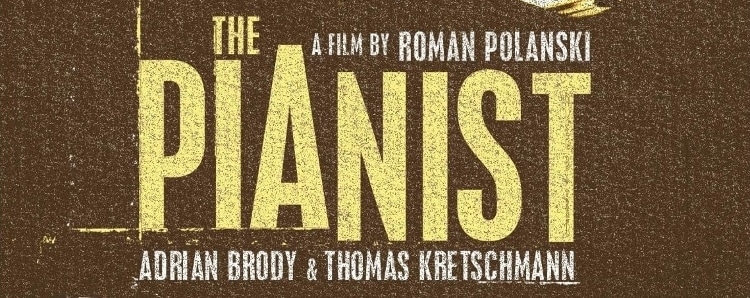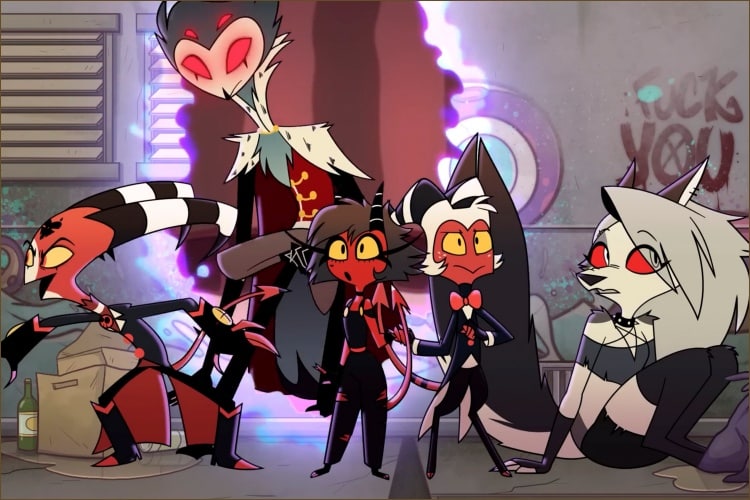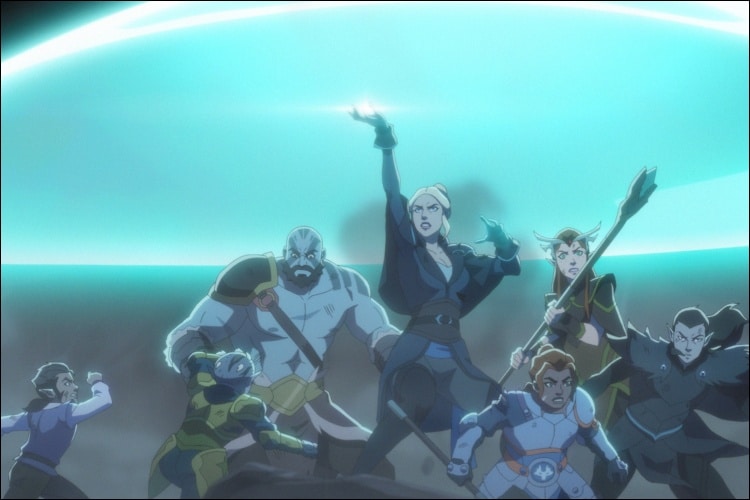Survival and Music
Main Cast: Adrien Brody
Director: Roman Polanski
Every time I see a dramatization of the events that took place during the Holocaust, I have the same thought. I don’t understand. How could this happen? How could people be so unimaginably cruel? How did anyone survive? The events themselves were so horrific, so dehumanizing, so unimaginable that it’s hard to get even the smallest grasp on what that time was truly like for the people who lived and died there. The Pianist is a movie that gives us that grasp. It allows us to see that time as it was for a single man.
The Pianist is the true story of Polish pianist Wladyslaw Szpilman (Adrien Brody). Opening in Warsaw in the year 1939, we meet Szpilman as he plays live for Polish radio. The building is promptly bombed by the Germans, forcing all inside to evacuate. For the most part nonplussed by this rather dramatic turn of events, Szpilman takes the time to notice a very pretty young lady as he flees. When he arrives home, he finds his family amidst a flurry of suitcases and boxes. They must leave. Poland is losing its struggle against the Germans. Then comes good news. The British and French are joining the fight; both are declaring war on Germany. The Szpilman family celebrates this news, to them it means that they can stay put, the Germans will be stopped. They, like the rest of the world, have no idea what is to come.
As the German hold on Poland strengthens, rules and regulations regarding the behavior of the Jewish citizens pile one on top of another. Soon, they are wearing the dreaded insignia and walking in gutters. Wladyslaw and his family adamantly refuse these demeaning laws, yet eventually abide, as there is no other way to survive in this world that is rapidly becoming a nightmare. Wladyslaw experiences the beginnings of a romance with Dorota (Emilia Fox), which we can see is doomed from the start, as she is a gentile, he a Jew. Soon romance is a thing of the past, and all the Jews are ordered into the infamous Warsaw Ghetto, where life is a constant struggle against the Germans, starvation, humiliation and each other. Wladyslaw spends each day doing what he must to survive. As situations arise, he reacts, or is acted upon. We see the Holocaust through his experiences alone.

What makes The Pianist so different from most movies about this hideous era is precisely that. These are the experiences of a single man. We are so often given movies with stories trying to convey the magnitude of cruelty and suffering. The concentration camps, mass graves, huge columns of lockstepping troops. It’s easy to just become overloaded with images of torture and barbarity. Eventually we shut down a little to help us cope with what we’re seeing. In The Pianist, the camera takes a step back from the big picture. The enormity of the disaster is in the background here. We know it’s there, we know what’s happening on the larger scale, but that isn’t the focus. We are able to focus on one man. The fact that the story is true helps us realize that what we are seeing is meant neither to shock nor sadden us, it’s a simple telling of what was. There’s no arguing the merits of the story, the heroes and villains. This isn’t simply a screenplay; it’s a man’s life. As Wladyslaw slowly decompensates from a dapper young man with talent to spare and a shining future into a desperate shadow of his former self whose only goal is survival, we finally see that big picture. We can see it in what he has to do, what his world has become, the many and varied people he encounters. But mostly we see it in the eyes, the posture, the man that embodies the Holocaust for us in The Pianist. Wladyslaw becomes the symbol of survival. We come to understand that this doesn’t mean bravery, cunning, stealth. Those elements are there, but more often there is luck, and circumstance, and help. Wladyslaw relies on all these things as he fights to live through the war. He isn’t a hero in the traditional sense. He’s a hero because he’s alive. He’s a hero because he tells his tale so that others can understand what it takes, every day, to stay alive as a Jew in Poland during WWII. That is what The Pianist gives us that is truly unique, the chance to know this man, to glimpse his world, to try, just a little, to understand.
By far the two most outstanding elements in this film are the cinematography and the performance of Adrien Brody. Director of Photography Pawel Edelman takes us inside the Warsaw Ghetto. As the movie progresses, the colors become more and more muted, the vibrancy going out of the world as the cruelty seeps in. Shots of the Germans building the wall that is to surround the ghetto, shooting people with the cavalier attitude of those playing a game, the confusion and disbelief in the Jewish community as things get progressively worse. Each is filmed through the eyes of Wladyslaw. It’s as though we are part of his world, not simply looking in. I can’t think of a truer sign of brilliant photography. The single most incredible shot of the film comes when we see Wladyslaw alone in the deserted ruins of what once was Warsaw. This single sequence tells more about the horrors of war than some entire movies.
Adrien Brody won the Academy Award for Best Actor for this performance. Deservedly so. He is this movie. His Wladyslaw, at the beginning so impervious, at the end so thoroughly beaten, is the performance of a lifetime. As his world deteriorates, we watch his disbelief, horror and impenetrable grief play on the face of Brody. Determination and desperation somehow intermingle as Wladyslaw stumbles his way through disaster after disaster. There isn’t really much more to say. This is Brody’s movie to either bring alive or let die. The story not only lives, but does so with an honest clarity that is as breathtaking as it is heartbreaking.
Throughout the movie is Wladyslaw’s music. He performs, he hears his music in his head, he plays without benefit of a piano. The piano solos by Janusz Olejniczak and the rest of the score by Vojchiech Kilar do a great job of providing a kind of surreal gentility underscoring the horror that is this life and this time.
Director Roman Polanski gives us a very personal film in The Pianist. While undoubtedly personal to him as a man, that’s not what I mean here. I mean personal in the way he presents the material. Szpilman is our constant focus, we come to know him, fear for him, desperately hope for his continued survival. In making the Holocaust personal, somehow Polanski helps us see the more global issues with a clarity that escapes so many movies whose sole goal is to show us the grand scale of this tragedy. Some people aren’t going to like how this man is presented, or how some of the very real atrocities of WWII are not covered in graphic depth. I, on the other hand, appreciated this tremendously intimate portrait of a single human being living, somehow, in the midst of this insanity. It didn’t happen this way for everyone, we are given sufficient evidence of that. But it happened this way for this man. His story is gripping, horrifying and in a small way uplifting. Wladyslaw is an everyman. I could imagine myself in his shoes. And it helped me understand, if only a little. That, in and of itself, is a remarkable achievement. The incredible photography and performance by Adrien Brody add extra layers to the story and give it extra power. A tremendous film, I highly recommend The Pianist. The themes and presentation are very adult, so this isn’t a movie for children. It also isn’t for the squeamish, as the documentation of the Holocaust in Wladyslaw’s world is never put in soft focus. But if you want a personal slice of history, served up with grace and remarkable imagery, The Pianist is more than worth a watch. Four and a half stars.

Sue reads a lot, writes a lot, edits a lot, and loves a good craft. She was deemed “too picky” to proofread her children’s school papers and wears this as a badge of honor. She is also proud of her aggressively average knitting skills. TV and indie movies are her jam.





Leave a Reply